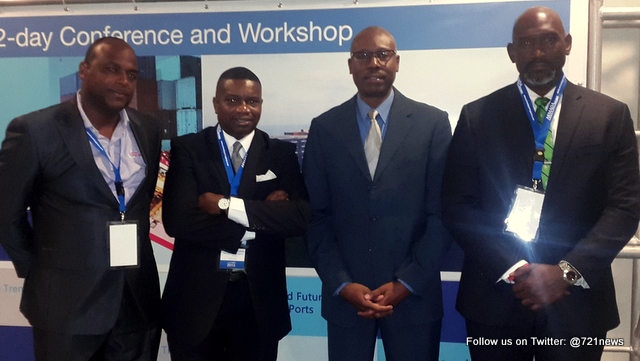
POINT BLANCHE, St. Maarten – Port St. Maarten – Port St. Maarten management officials were in Aruba from May 1-2 attending a Regional 2-day Conference and Workshop held under the theme “Challenges and Future Trends for Caribbean Ports.”
The aforementioned was hosted by the Government of Aruba, STC BV Rotterdam in conjunction with the Directorate of Shipping Aruba, regional port authorities and ship charters.
The meeting brought key groups together to discuss the many challenges facing port operations and ship charterers today. Various speakers and industry leaders spoke about current industry trends and developments and provided updates on regional policy and initiatives.
Some of the topics discussed were: Safe, Secure and Efficient Shipping On Clean Seas in the Wider Caribbean; Identifying Opportunities for Collaboration and Engagement between Caribbean countries; Port Development & Networking Function of Ports in the Region; The Importance of an Efficient Port Operation in the Freight Market.
The presentations gave Port St. Maarten officials insights into solution oriented strategies with respect to training, real-time surveillance of shipping lanes, design initiatives within port operations, which also includes physical and operational structures.
The International Maritime Organization (IMO) regional adviser spoke of conventions and policies in the planning that will help Caribbean ports to become and remain compliant to the minimum international standards.
Aruba’s Minister Plenipotentiary presented a case study of the number of containers moving from the United States and the Netherlands to the Dutch Caribbean. He also compared the efficiency of Caribbean ports vs international ports and highlighted the reasons why certain ports because of efficiency could not compete as a transshipment port for the PANAMAX vessels.
Using additional case studies from certain ports that made huge turnarounds to increase efficiency, he identified strategies to correct Caribbean ports inefficiencies.
It was also pointed out that Customs has a role to play from enforcement to facilitator which would allow for a more reliable cargo flow.
It was revealed during one presentation that the Port of Amsterdam consults other ports with respect to innovation and the change of business, introducing their initiative of going from a landlord port to a network port, their goal being, “Make your challenges make money for you”.
Port St. Maarten’s goal at the conference was to seek out partnerships and identify areas of cooperation. 45 port/cargo businesses related entities and seven Caribbean countries took part in the conference.
It is estimated that 90 per cent of the goods circulating worldwide are transported by sea, placing maritime trade at the heart of the issues related to economic growth. Hence, the importance of Port St. Maarten and the role it plays in the north eastern Caribbean area.
Port St. Maarten cargo facility investments have led to a steady growth in containerized business making the island a regional sub-hub for the aforementioned area.
The port serves the islands of Anguilla, Montserrat, St. Kitts & Nevis, and Antigua & Barbuda. The port is also in the process of developing a special relationship with the Caribbean Netherlands islands of Saba and St. Eustatius with respect to port handling, operations, economic development and sustainability. Both islands receive their cargo shipments/services from Port St. Maarten.
The Caribbean, though small in population and economic activities, except for tourism, constitutes a major crossroads for international maritime trade.
With its proximity to the Panama Canal, also as a major focal point for north/south Atlantic trades and trades with the east and northern coasts of South America, maritime transport and related logistics services have become vitally important for the economic performance of the region.
Caribbean ports contain a variety of facilities such as bulk cargo facilities, container facilities and facilities that handle petroleum products and liquefied natural gas.
Port St. Maarten board of supervisors and management understand that the opening of the expanded Panama Canal will place much greater emphasis on feeder ports such as St. Maarten and the port is looking at further enhance its role as a regional player.
The Regional Conference and Workshop took place at the Radisson Aruba Resort, Casino & Spa.
PHOTO CUTLINE: L to R: Port St. Maarten Simpson Bay Lagoon Authority Corporation Bertrand Peters, Carlyle de Couteau, Aruba Head of Shipping Directorate, Colin young, Regional Maritime Advisor for the International Maritime Organization in the Caribbean, and Port St. Maarten Security and Safety Manager Roberto Levenstone.





























